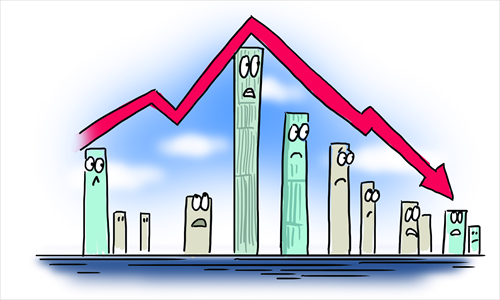HOME >> OP-ED
HK needs to rediscover values to prosper
Source:Global Times Published: 2016-3-9 23:33:01

Illustration: Shen Lan /GT
From the Occupy Central movement to the Mong Kok riot in February, unrest has put Hong Kong under spotlight and soured its relations with the Chinese mainland. Yet as the central government endeavors to push forward the 13th Five-Year Plan, Hong Kong can still make its contributions. Hong Kong can offer policy suggestions for the mainland as a well-developed and functional market economy, and provide experiences or even lessons regarding the rule of law.
The 13th Five-Year Plan will bring many opportunities, but to make use of them Hong Kong first has to reflect on itself deeply and thoroughly.
It is widely acknowledged that Hong Kong is fundamentally a law-based society, but does it need improvement in the rule of law? My answer is definitely yes.
Hong Kong can never stop checking whether its laws are consistent with the world's development and are well implemented. In the Occupy Central movement and the Mong Kok riot, violations of laws were not punished as they are supposed to be in a law-based society. Hong Kong has to realize that it either forges ahead or falls behind in legal development.
Besides, Hong Kong is a highly open society and from its international exchanges the mainland's economic development has benefited heavily. Yet as the mainland has been upgrading its foreign connections, Hong Kong seems to be losing this function as a bridge and hence needs to take a careful look at itself.
To maintain its advantages, Hong Kong has to improve the quality of its foreign exchanges rather than the quantity. In other words, Hong Kong needs to conduct economic restructuring.
The national 13th Five-Year Plan proposes to support Hong Kong to become an Asia-Pacific center for dispute resolution. But is Hong Kong capable of realizing the target? What categories of disputes can Hong Kong resolve since the function needs institutions, talents and rules? These all need deliberation.
Right now, Hong Kong needs to pay more attention to the tendency of international development. Hongkongers' lingering pride and superiority about the past glory have pushed it away from the mainland and strained their relations, but they need to bear in mind that tomorrow is the most important day.
For instance, some Hongkongers like to recall their advantages compared to the mainland when they were under British rule, but they don't realize that without the mainland's massive support, Hong Kong would have seen a steeper plunge.
Though Hong Kong has had the conditions needed to develop an Internet economy, it yet lags behind the mainland in this respect since it neglects the demands of the modern world. This has to be noticed.
In a rapidly changing world, not everyone in a metropolis like Hong Kong has an international view and keeps up with the trend in the world.
This has to be changed and the Hong Kong government needs to discover its deficiencies and get back on the right track with an eye on what's going on in the world. It also needs to better train officials such as judges and legislators and make them more capable of doing their work.
Hong Kong has seen rifts that are triggered by a slew of factors including external forces. Yet it is always easier to point the finger at others than come up with solutions. An unsettled Hong Kong needs to look into the future, build an inclusive and principle-based society and give hope to the majority of its people.
The article was compiled by Global Times reporter Sun Xiaobo based on an interview with Wang Guiguo, former dean of Chinese and Comparative Law, City University of Hong Kong, and a member of the 12th National Committee of the Chinese People's Political Consultative Conference. sunxiaobo@globaltimes.com.cn
Posted in: Viewpoint